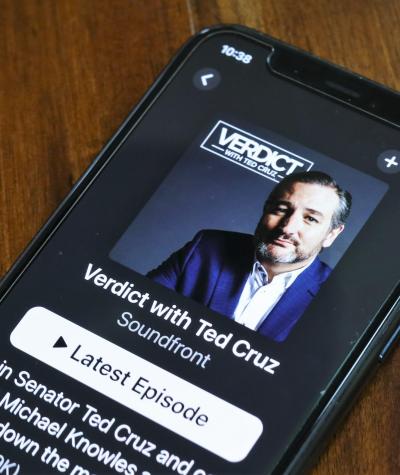When Senator Ted Cruz made a deal in 2022 with a major media corporation, iHeartMedia, to help produce and more widely distribute his podcast, “Verdict with Ted Cruz,” he insisted that he wasn’t personally benefiting from the podcast deal and that he was volunteering his time, comparing his work hosting the now thrice-weekly podcast to his appearances on cable or network television shows.
iHeartMedia also asserted that Cruz was not being paid to appear on the podcast under the deal. Nor has Cruz’s campaign committee reported receiving any financial benefits from the podcast deal.
Yet money has still changed hands in a way that unquestionably benefits Cruz as he campaigns for reelection in 2024: Since March 2023, iHeartMedia has sent over $630,000 to a federal super PAC, “Truth and Courage PAC,” whose stated goal is to help reelect Cruz.
The money from iHeartMedia represents nearly a third of the super PAC’s receipts this election cycle, and the super PAC has already begun spending money to support Cruz.
The super PAC has described these payments on its disclosure reports as “digital income” or “digital revenue,” and in response to news reporting about these payments, iHeartMedia acknowledged that this money was revenue from its ad sales associated with Cruz’s podcast (a revelation that one of iHeartMedia’s ad customers wasn’t thrilled about).
The most rational and logical conclusion from these facts is that Cruz and iHeartMedia agreed that the corporation would send this money, which was derived from iHeartMedia ad sales, to Truth and Courage PAC, which is already helping to reelect Cruz in 2024.
That would be a violation of federal campaign finance laws, which for over twenty years have prohibited federal officeholders and candidates, like Cruz, from raising and spending corporate money in connection with a federal election.
The Bipartisan Campaign Reform Act of 2002 (BCRA), sometimes called “McCain-Feingold” for its principal sponsors in Congress, explicitly prohibits any federal officeholder or candidate from soliciting, receiving, directing, transferring, or spending funds in connection with a federal election, unless those funds comply with federal prohibitions, limits, and reporting requirements.
Those laws make clear that corporations cannot contribute to candidates’ campaigns, which means that as a senator and federal candidate, Cruz cannot ask, request, instruct, or guide a corporation to contribute money to his campaign, or to any other federal candidate or committee, including a super PAC.
The bottom line is that if Cruz entered into an agreement with iHeartMedia in which iHeartMedia would send its ad revenues associated with the podcast to a super PAC working to reelect Cruz, he broke the law.
This is why Campaign Legal Center (CLC) and End Citizens United (ECU) have filed a complaint with the Federal Election Commission (FEC), urging the FEC to investigate the matter and enforce the law.
This FEC complaint follows a 2022 CLC ethics complaint alleging that the Cruz podcast deal violated federal laws and Senate ethics rules that prohibit registered lobbyists from giving gifts to members of Congress, including gifts of service.
As CLC noted in its ethics complaint, iHeartMedia is a registered lobbyist that spends millions of dollars on lobbying each year; at the time of the podcast deal, iHeartMedia was lobbying on two bills before a Senate committee on which Cruz serves as the ranking member.
Concerns about federal candidates violating federal laws barring the use of soft money are far from new: Throughout the 2024 election — and for years before that — presidential and congressional candidates have been brazenly violating the federal campaign finance laws that prohibit soft money from influencing our elections.
CLC has filed complaints against several candidates that have sought to use funds that don’t comply with federal campaign finance laws. Yet the FEC has yet to take action to ensure these crucial legal safeguards are taken seriously.
When federal candidates and officeholders use money from corporate special interests to advance their election efforts, those special interests are often rewarded with access, influence, and power in the political process; their voices grow louder, drowning out the voices of everyday Americans.
That helps foster a political environment where corruption can flourish and undermines voters’ basic right to meaningful participation in the democratic process.
The FEC should thoroughly investigate soft money violations and enforce the law, ensuring that violators are held accountable and to help deter future candidates from engaging in the same kind of illegal conduct.
It’s essential that the FEC take swift action to safeguard our elections from real and apparent corruption, and to preserve ordinary Americans’ right to have their voice heard through the democratic process.

